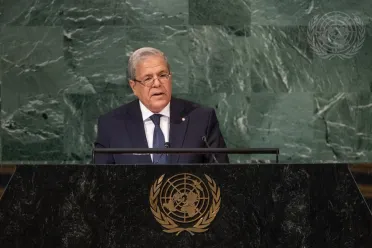Statement
Statement summary
OTHMAN JERANDI, Minister for Foreign Affairs Migration of Tunisia, pledged support for the Secretary-General’s Our Common Agenda report, calling it a ray of hope for the international community in a time where the economic, humanitarian and health-care related consequences of the pandemic seemed impossible to overcome. Despite many Tunisia-supported United Nations frameworks, like the Paris Agreement, the Sendai Framework, the 2030 Agenda and more, based on equality and solidarity, there are still people threatened with being left behind. He went on to note the many challenges the world faces: an imbalance in the international system and a lack of solidarity; climate change and natural hazards; migration and refugee problems; and famine, malnutrition and food insecurity. And, just when the world only started to come out of the pandemic, the war in Ukraine exacerbated everything including energy and food crises, supply chain issues, purchasing power decline and inflation. This time in history requires the leaders of the world to find transformative and radical solution to strengthen durability and resilience, he stressed. During every session of the General Assembly new issues are added, but today it is time for solutions, he said.
He emphasized that traditional policies must be set aside, and crises need to be addressed from the root upward with innovative solutions to save future generations and achieve the Sustainable Development Goals. In that regard, he stressed six points: Solutions must be developed through multilateral action under the auspices of United Nations coordination while making use of complementary frameworks and organizations; new economic models are needed that focus on the quality instead of speed of economic growth and prioritize investment in technology and science; the world needs new approaches to debt management; better development of the African continent based on equal partnership is necessary; bolstering international peace and security based on rule of law and international legitimacy. In that light, he reiterated his position that the occupation of Palestine must end and an independent State needs to be founded, and there must be recognition that every country has unique challenges and characteristics and thus there is no one size fits all approach to development.
For Tunisia, he continued, democracy is a national choice from which the people will not deviate. As stated in various regional and international bodies and shown by Tunisia’s participation and contributions to many United Nations initiatives, he reaffirmed his country’s commitment to freedom, constitutional rights, sovereignty and rule of law. Emphasizing that multilateralism must be bolstered and trust in institutions restored, he called upon all to build a world with security, humanity, prosperity and sustainability for people now as well as for the future generations.
Full statement
Read the full statement, in PDF format.
Photo

Previous sessions
Access the statements from previous sessions.
